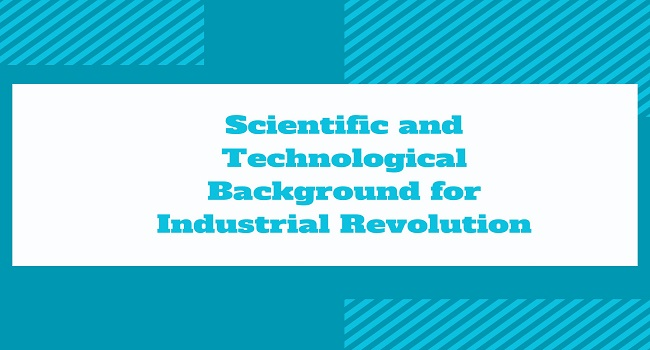Scientific and Technological Background for Industrial Revolution:
Owing to the narrow ideas of the stable feudal society of the medieval period, science did not make much progress in Europe. A good deal of technical inventions were made in order to expand the arable land and to put it to good use as well as to make good the shortage of workers and artisans. Owing to the dire shortage of artisans in the Middle Ages, people started the use of animals, wind, and water as sources of energy. Agricultural implements and other articles were manufactured on a large scale in the later half of the Middle Ages. Additional production boosted further production. By and by, trading society replaced the hereditary feudal setup which was based on forcible exploitation of farmers. It introduced the system of manufacturing consumer goods on a large scale and making payments through currency. That system increased the volume of business rapidly. It was further strengthened by improvements in marine navigation.
The global expansion of trade and commerce strengthened the position of the business class. After some time, the business class succeeded in driving feudal barons and landlords out of government offices. Since the 17th century, the path had been paved for furthering the new capitalistic system of production. Royal and feudal sanctions (restrictions) on production, trade, and commerce were removed. As a consequence of a great political, religious, and intellectual struggle, the bourgeoisie had preliminary success in furthering the development of the capitalistic economy. By the end of the 18th century, people of the urban middle class had completely redeemed themselves from feudal dominance. In order to feed the increasing global markets with various products, they could invest capital in industries and earn profit. The feudal economy was transforming into a capitalistic economy. Marvelous technical inventions of that time encouraged changes. Thus it is manifest that by the middle of the 18th century, the gradual technical innovations in the method of production brought about rapid change. The important fact is that the common man started adopting new techniques of experimental science during the 16th and 17th centuries. Advanced techniques introduced by experimental science brought about stupendous changes in the processes of production. It is known as the Industrial Revolution.
We should understand that science did not play a direct role in the Industrial Revolution but industrial technology played an important role. However, technological knowledge and design depended upon science for example, Newton’s theories about speed, velocity, energy, and power made a great contribution towards technological innovations and development. Without the theories of experimental science, the steam engine which became a vital force in the Industrial Revolution might not have been invented.









Comments (No)